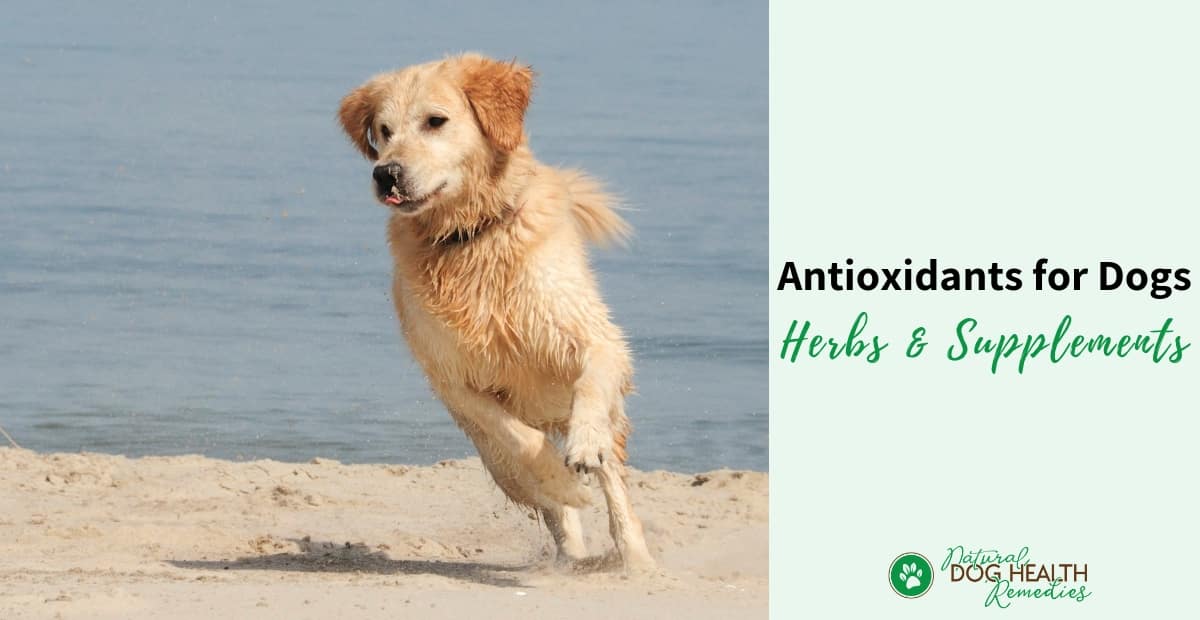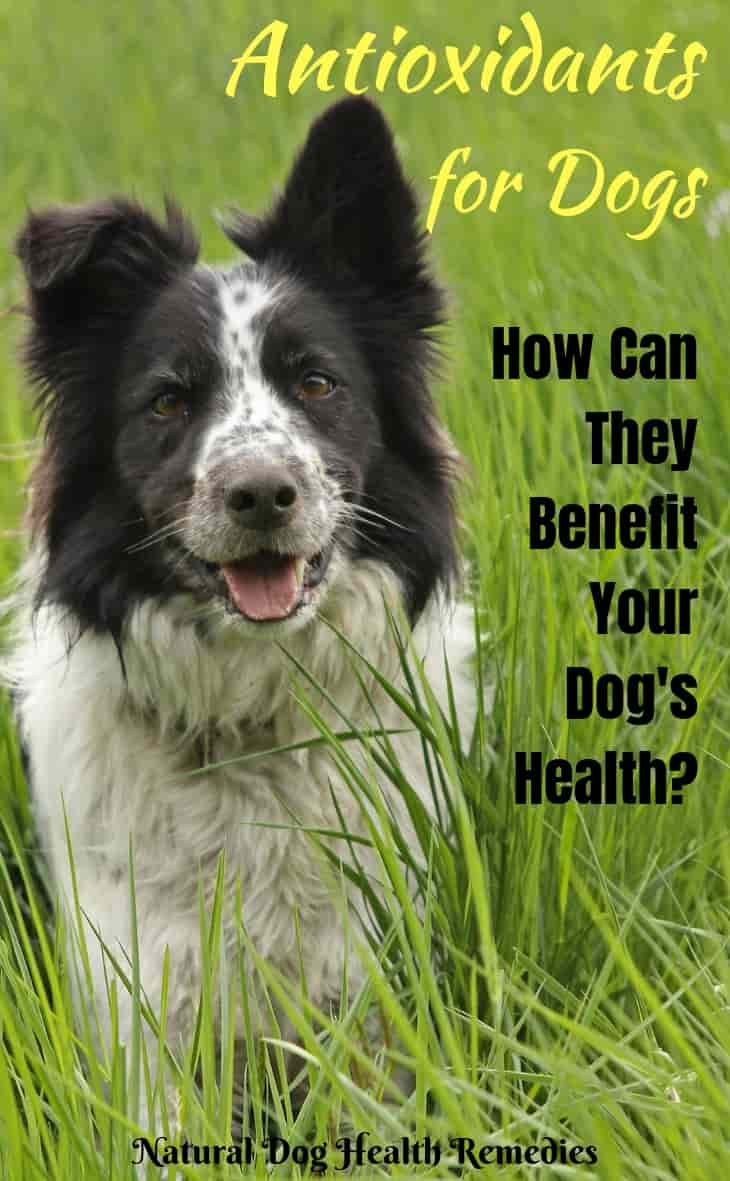Antioxidants for Dogs
(FTC Disclosure: If you make a purchase via a link on this page, I may receive a small commission, at no added cost to you.)

Overview
You most likely have heard of "antioxidants" and are perhaps using some antioxidants as daily supplements for optimal health.
We use antioxidants to slow the aging process by protecting the body from damage caused by free radicals. Antioxidants can also support immune function, and reduce the risk of chronic degenerative conditions such as cancer, arthritis, and heart disease.
Like people, dogs can also benefit from antioxidants. More and more veterinarians are paying attention to the health benefits that antioxidants have on our dogs and very often they recommend supplementation of antioxidants for dogs.
This page takes a look at the following topics:
- What are Free Radicals?
- What are Antioxidants?
- Do Our Dogs Need Antioxidants?
- What are Some Specific Functions of Antioxidants?
- Can Herbs be Used as Antioxidants for Dogs?
- What are Some Good Products of Antioxidant Supplements for Dogs?
What are Free Radicals?
Free radicals are molecules, atoms, or ions with unpaired electrons. Normally, in an atom (or molecule), electrons come in pairs and they spin in opposite directions to balance each other.
Free radicals, with their electrons missing, react with other molecules in the cells (such as protein or DNA) and rob them of an electron in order to restore stability. This process is called oxidation and can ultimately cause damage to a cell.
Oxidation occurs inside each and every cell of all living animals and humans because free radicals are produced as a result of normal bodily processes such as the release of adrenaline.
Environmental factors (such as nuclear radiation, x-rays, UV rays from the sun, tobacco smoke, food additives, chemical pollutants such as pesticides, insecticides, and herbicides) can also cause free radicals to release.
It is believed that oxidation and the release of free radical can cause cell damages resulting in numerous diseases and speed up the aging process.
What are Antioxidants?
 Antioxidants are some vitamins, minerals, enzymes or other chemical compounds that can stop the process of oxidation.
Antioxidants are some vitamins, minerals, enzymes or other chemical compounds that can stop the process of oxidation.
The antioxidant works by giving up one of its electrons to the free radical, thereby neutralizing it and preventing it from attacking DNA or causing lipids to oxidize. Once it gives up an electron, the antioxidant loses its antioxidizing function and has to be replaced by other antioxidants.
Vitamins A, C, and E, Carotenoids, Selenium, Coenzyme Q10, and Alpha Lipoic Acid (ALA) are all powerful antioxidants.
The best sources of antioxidants from natural foods include fresh fruits (e.g. berries - blueberries, blackberries, raspberries, wolfberries; pomegranates), vegetables (e.g. dark green leafy vegetables; broccoli; beets; green beans; peas; carrots), and whole grains.
Do Dogs Need Antioxidants?
The answer is a definite "Yes" for the following two main reasons:
- These days many dogs are exposed to environmental pollutants and harmful chemicals such as pesticides, insecticides, and cigarette smoke. These pollutants and chemicals cause free radicals to release and cause oxidation in the dogs' bodies.
- Many dogs do not eat enough fresh veggies and fruits to get the antioxidants needed for their bodies. In particular, those who are fed commercial pet food need supplements of antioxidants because such pet food contains a minimal amount of antioxidants.
All dogs can benefit from supplements of antioxidants. In particular, aging dogs and those with the following health problems should definitely take some kind of antioxidants for dogs:
- Arthritis and joint problems such as hip dysplasia
- Skin allergies
- Eye problems such as cataracts
- Respiratory problems such as asthma
- Autoimmune disorders
- Chronic infections resulting in suppressed immunity
- Heart disease
- Cancer
Specific Functions of Antioxidants for Dogs
Although all antioxidants are beneficial to dogs, some specific antioxidants are particularly effective in helping to treat certain dog health problems.
It is therefore helpful to understand more about the various specific functions of antioxidants so that you are in a better position to choose an appropriate supplement for your dog's specific needs.
Vitamin A
- Helpful for the growth and repair of body tissues
- Assists in the maintenance of healthy skin and mucous membrane
- Good for the eyes
- Beneficial to dogs with eye problems (e.g. cataracts); respiratory problems (e.g. asthma); skin problems (e.g. eczema).
Vitamin C
(Click on the link for more info)- Promotes wound healing
- Strengthens blood vessels
- Maintains healthy skin
- Strengthens immune system and helps prevent and resist infections
- Beneficial to dogs with chronic infections; allergies; weakened immune systems; and skin problems (e.g. eczema).
Vitamin E
- Slows down cellular aging caused by oxidation
- Strengthens cells by bringing nourishments to them
- Strengthens capillary walls
- Assists in the maintenance of healthy skin
- Beneficial to dogs with skin irritations and allergies; heart problems; and cancer.
Selenium
(Click on the link for more info)- Slows down cellular aging caused by oxidation
- Promotes and preserves tissue elasticity
- Assists in the maintenance of healthy membrane tissue
- Beneficial to dogs with cancer (prevention & treatment); inflammations and infections (e.g. IBD); and heart problems.
Carotenoids
- Effective scavengers of a free radical called "singlet oxygen" thereby preventing lipid peroxidation
- Prevent degenerative diseases
- Strengthen and protects eye membranes
- Reduce incidence of cataracts
- Beneficial to dogs with eye problems (e.g. cataracts); cancer (prevention & treatment); allergies; and respiratory problems.
Alpha Lipoic Acid
- Scavenges hydroxyl radicals, singlet oxygen and hypochlorous acid
- Removes heavy metals by chelation
- Regenerates other antioxidants such as vitamins C and E, and Coenzyme Q10
- Anti-aging
- Beneficial to aging dogs and dogs with cancer (prevention & treatment).
Coenzyme Q10
(Click on the link for more info)- Strengthens the heart muscle
- Prevents cellular damage caused by oxidation
- Improves carbohydrate metabolism
- Maintains gum health
- Beneficial to aging dogs and dogs with heart disease; gum disease; and immune problems.
Grapefruit Seed Extract
(Click on the link for more info)- Cancer prevention
- Prevents cellular damage caused by oxidation
- Supports and maintains healthy skin condition
- Improves blood circulation
- Prevents premature aging
- Beneficial to aging dogs and dogs with heart problems; skin problems; and cancer.
Herbs as Antioxidants for Dogs
Besides the above vitamins and chemical compounds that can be supplemented to your dog as antioxidants, you can also use certain herbs that contain antioxidants for your dog's health.
Common herbal antioxidants for dogs include:
Culinary Herbs
Herbs such as turmeric, oregano, thyme, ginger, parsley, and celery seed are powerful antioxidants that contain lots of vitamins. These herbs are convenient to use because they can easily be given to your dog by sprinkling them on your dog's food.
Milk Thistle
Another herb that is a powerful antioxidant is milk thistle.
The major constituent of milk thistle, Silymarin, is an effective antioxidant especially for the liver. It blocks the entrance of harmful toxins and helps to remove these toxins from liver cells. It can also regenerate injured liver cells by inducing new DNA and RNA synthesis. Therefore, milk thistle is particular helpful for dogs with liver problems.
Green Tea
Green tea contains the highest concentration of powerful antioxidants called polyphenols. Green tea has been found to be helpful in the prevention of heart disease and cancer. (Be sure to use decaffeinated green tea as caffeine is harmful for dogs.)
Mushrooms
Mushrooms, in particular Reishi, Shiitake, and Maitake mushrooms, have been used in Traditional Chinese Medicine (TCM) for a long time.
They contain high levels of polysaccharides which have been proven to be able to boost the immune system. These mushrooms also have antioxidant properties and can be used for cancer prevention and liver support.
Antioxidant Supplements for Dogs
Here are some excellent natural antioxidant supplements for dogs that can be used to help keep your fur baby healthy:

Check This Out!
This formula contains organic herbs like flaxseed, pumpkin seed, burdock root, nettle leaf, as well as spirulina - all powerful antioxidants for your dog.
More Powerful Antioxidants for Dogs
Antioxidant Dog Treats!
Check out these antioxidant dog treats for your dog! They all contain ingredients that are superfoods with antioxidant properties: (Affiliate links)
C.J. Puotinen, Natural Remedies for Dogs and Cats (Keats Publishing, 1999).
M.L. Wulff-Tilford and G.L. Tilford, Herbs for Pets (Bowtie Press, 1999).
S. Messonnier, The Natural Vet's Guide to Preventing and Treating Cancer in Dogs (New World Library, 2006).
R.H. Pitcairn, The Complete Guide to Natural Health for Dogs and Cats (Rodale, 2005).
W.J. Dodds, D.R. Laverdue, Canine Nutrigenomics - The New Science of Feeding Your Dog for Optimum Health (Dogwise Publishing, 2015).
Check out this page for more information.





